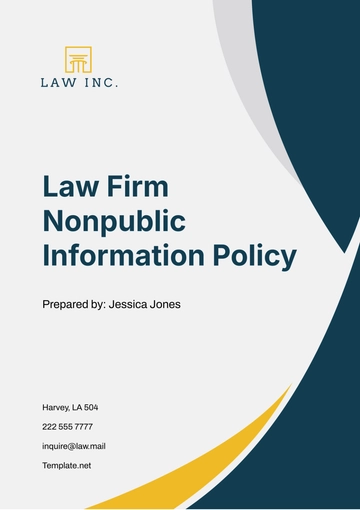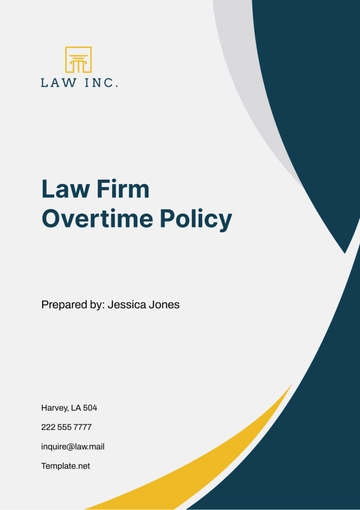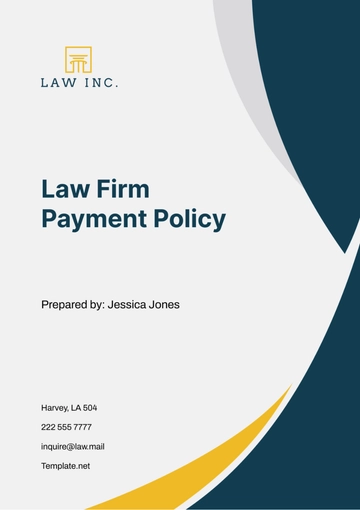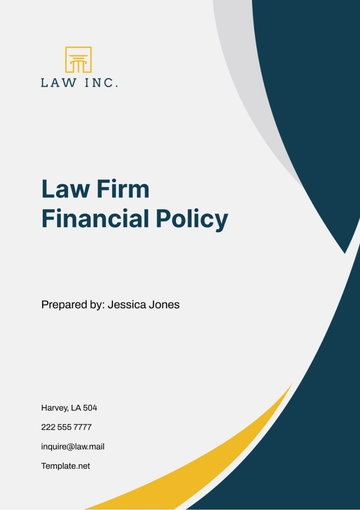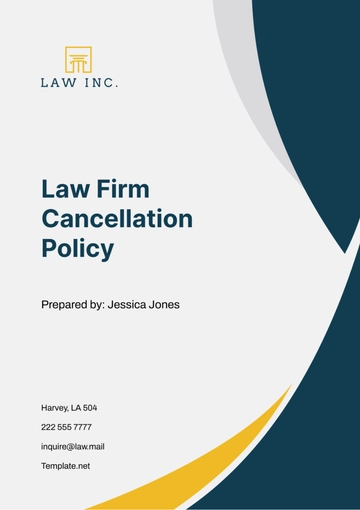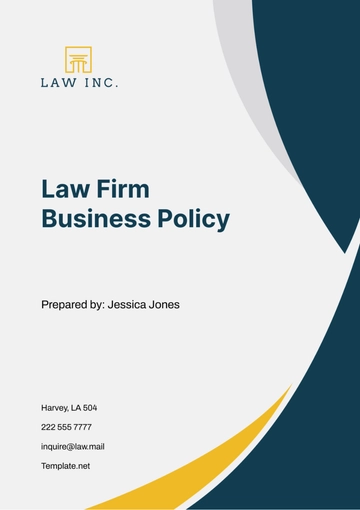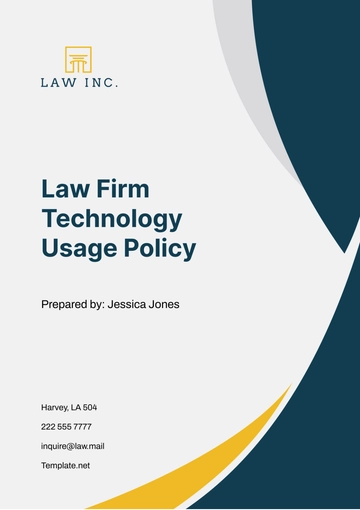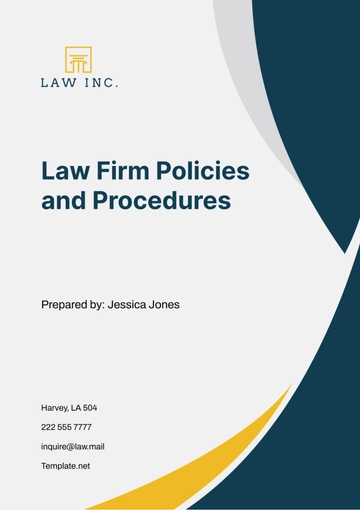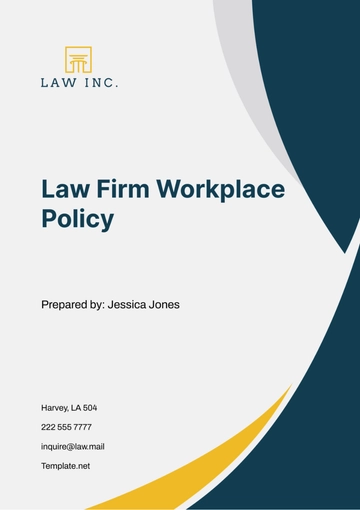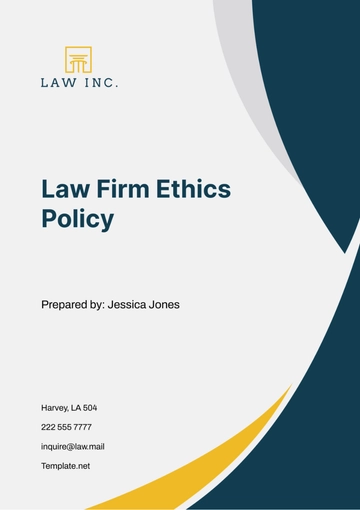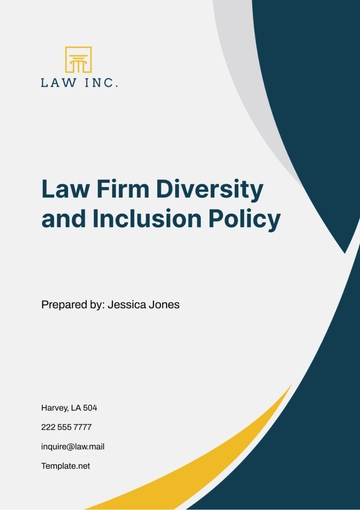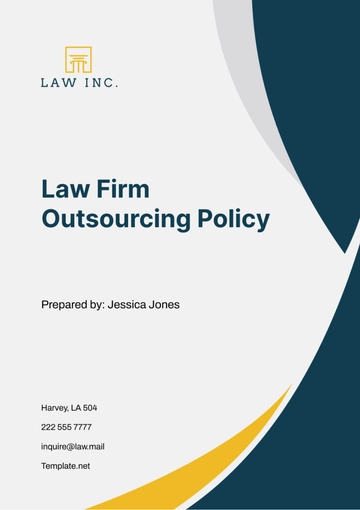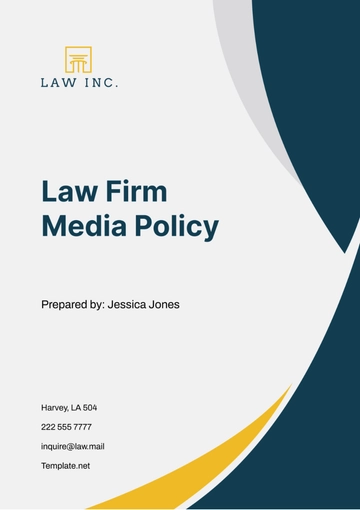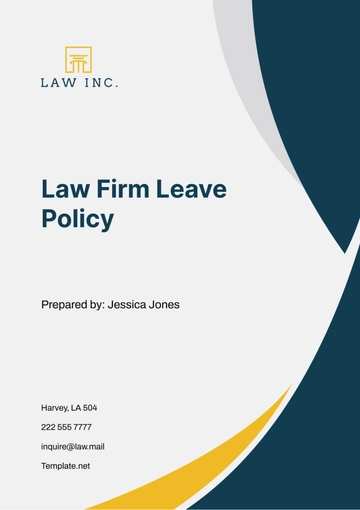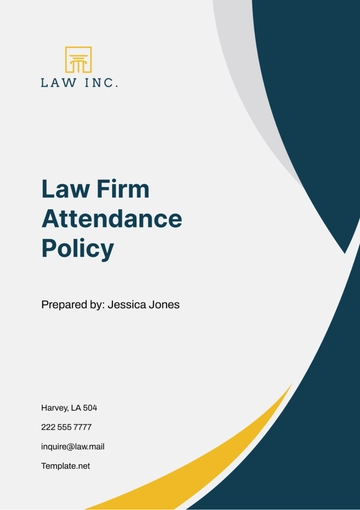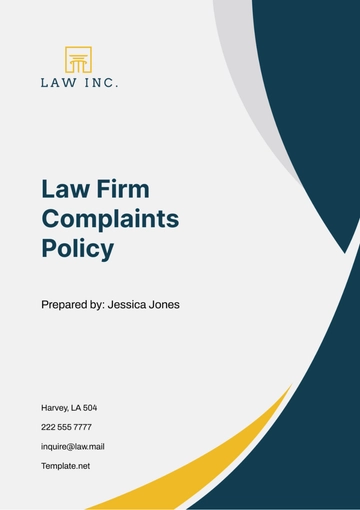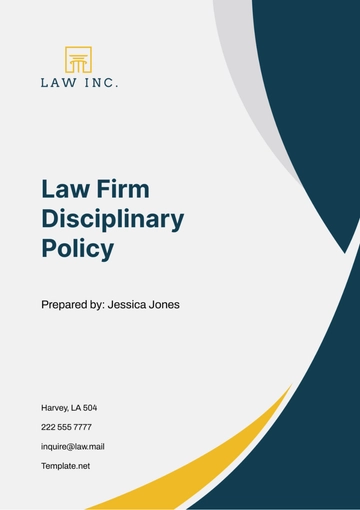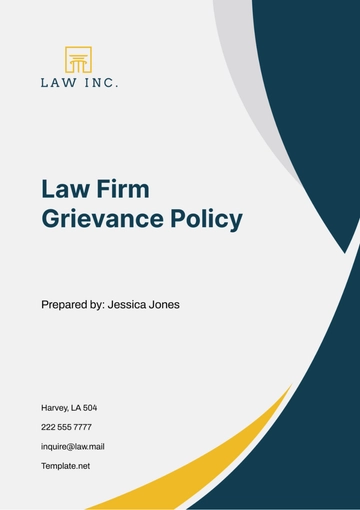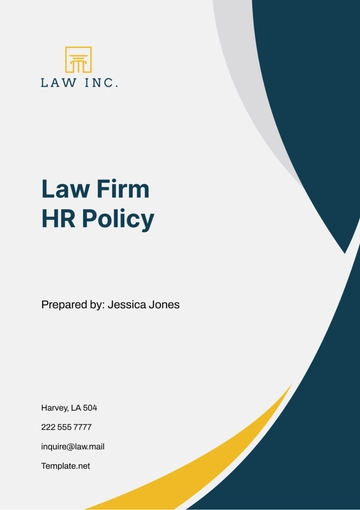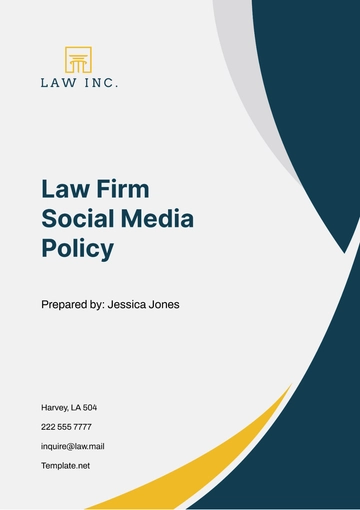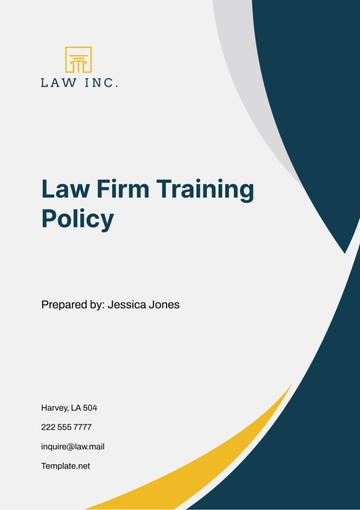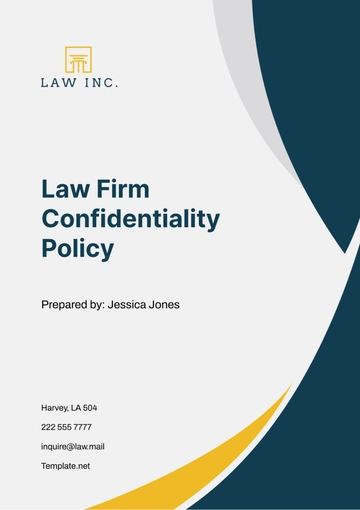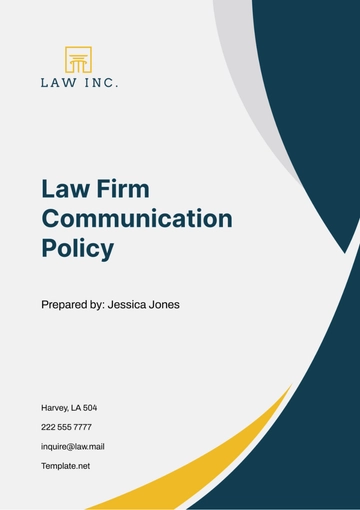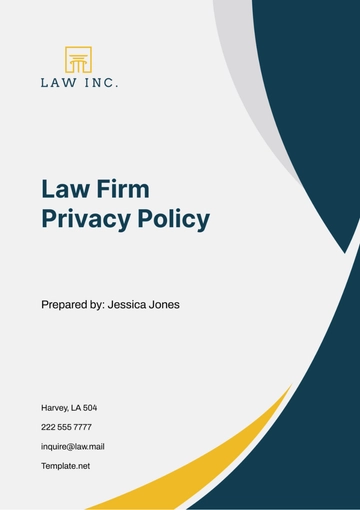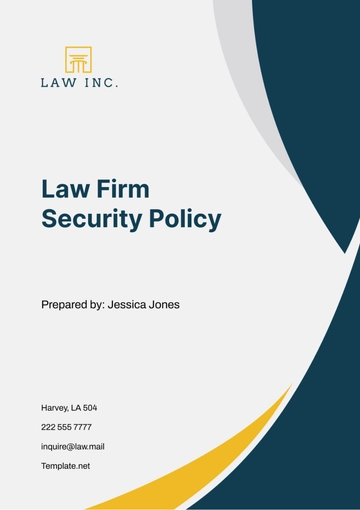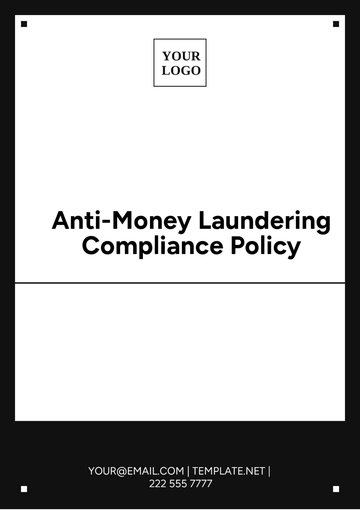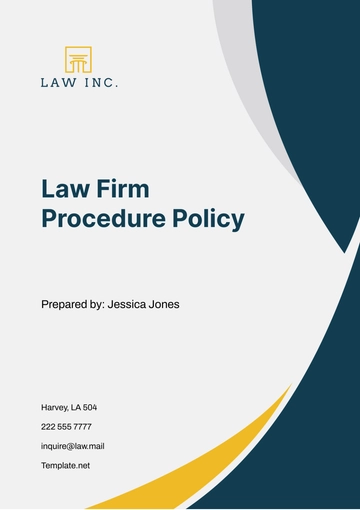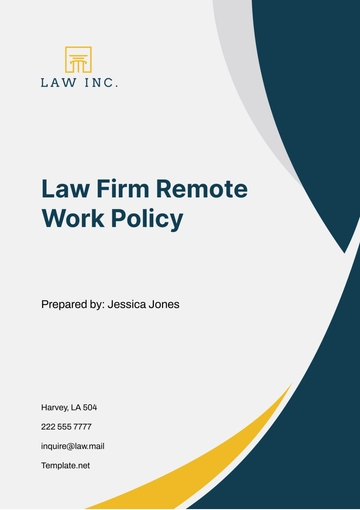Free Law Firm Attendance Policy
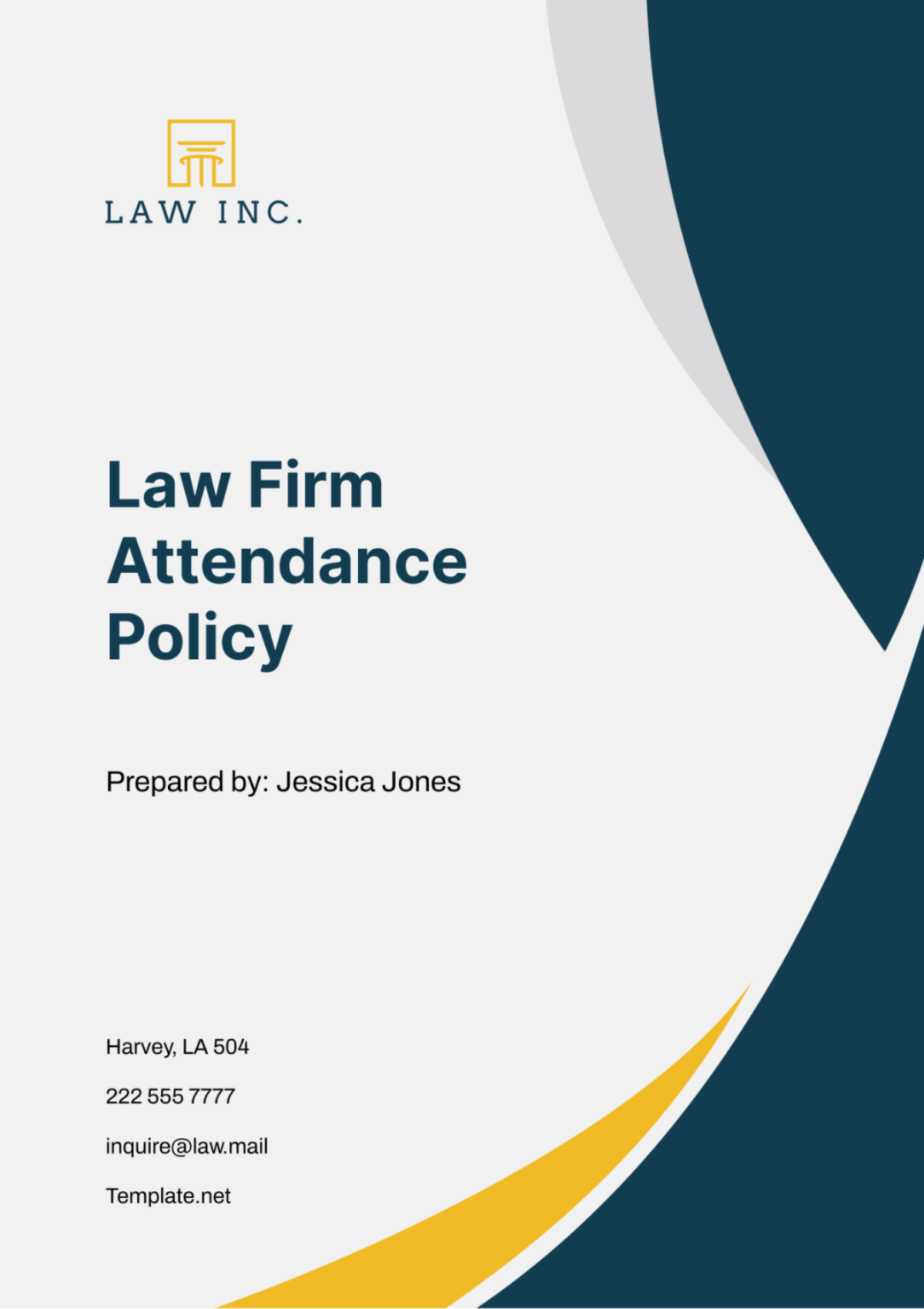
I. Purpose/Objective
This policy serves to delineate the expectations surrounding employee attendance at [Your Company Name]. Consistent attendance is paramount for upholding productivity levels, delivering exceptional client service, and safeguarding the prosperity of our firm. By establishing transparent guidelines, we aim to cultivate a workplace where all team members grasp the significance of punctuality, reliability, and accountability in fulfilling their professional obligations. Through adherence to this policy, we endeavor to foster a culture characterized by professionalism, collaboration, and an unwavering commitment to excellence. Such a culture not only enhances the reputation of [Your Company Name] but also solidifies our position as a leader in the legal industry.
II. Attendance Expectations
All employees are expected to adhere diligently to their scheduled work hours, demonstrating punctuality and reliability. This entails arriving promptly at the designated start time, observing the prescribed end-of-day hours, and respecting scheduled lunch breaks and rest periods. At [Your Company Name], we value the efficient use of time and recognize the importance of maintaining a consistent presence in the workplace to facilitate collaboration and client service. Our standard office hours are from [8:30 AM to 5:30 PM], providing a framework for effective communication and workflow management. Any deviations from these hours must be discussed and approved in accordance with our Flexible Work Arrangements policy.
III. Reporting Procedures
Timely communication regarding absences or lateness is crucial for maintaining operational efficiency and team cohesion. Employees are expected to follow established procedures for notifying their supervisor in cases of anticipated or unexpected absence. By adhering to these reporting guidelines, employees ensure transparency and facilitate effective planning within the firm.
A. Anticipated Absences or Lateness
Determine that you will be unable to attend work or will be late.
Notify your direct supervisor as soon as possible, preferably at least one hour before your scheduled start time.
Choose your preferred method of communication, either via email or phone call.
Clearly communicate the reason for your anticipated absence or lateness and provide an estimated duration, if possible.
Await acknowledgment or instructions from your supervisor regarding any necessary arrangements or adjustments to your schedule.
B. Unexpected Absences Due to Sickness
Assess your health and determine if you are unable to attend work due to illness.
Notify your supervisor of your absence as soon as possible, ideally before your scheduled shift begins.
If the illness persists for three consecutive days or longer, consult with a healthcare provider and obtain a doctor's note.
Provide your supervisor with the necessary documentation upon your return to work, ensuring compliance with company policies and procedures.
Keep your supervisor updated on your condition and expected return to work date, if applicable.
C. Notification Methods
Choose between email or phone call as your preferred method of communication.
Ensure that you have the necessary contact information for your supervisor readily available.
Craft a concise and professional message or conversation that clearly communicates your absence or lateness.
Provide any relevant details, such as the reason for your absence or your expected return to work date.
Await acknowledgment or further instructions from your supervisor and be prepared to provide any additional information as needed.
IV. Leave Policies
At [Your Company Name], we recognize the importance of providing employees with opportunities for personal and medical leave. Our leave policies are designed to support employee well-being while ensuring the smooth operation of our firm. Please refer to the table below for an overview of the types of leave available to employees, along with relevant guidelines for requesting and managing leave.
Type of Leave | Accrual Rates & Eligibility | Leave Request Procedures |
|---|---|---|
Sick Leave | Detailed in employee handbook | Submit request to HR department, 2 weeks in advance |
Personal Days | Detailed in employee handbook | Submit request to HR department, 2 weeks in advance |
Vacation Time | Detailed in employee handbook | Submit request to HR department, 2 weeks in advance |
V. Consequences of Non-Compliance
Adherence to the attendance policy is essential for maintaining operational efficiency and ensuring the delivery of quality service to our clients. Failure to comply with the policy may result in disciplinary measures, up to and including termination of employment. It is imperative that all employees understand the consequences of non-compliance and the impact it may have on their role within the firm.
Non-Compliance Issue | Disciplinary Action | Responsibility to the Firm |
|---|---|---|
Frequent Lateness | Verbal warning for first offense, written warning for subsequent offenses | Maintain consistent attendance, arrive punctually |
Unreported Absences | Written warning for first offense, suspension for subsequent offenses | Notify supervisor of absences in a timely manner, follow reporting procedures |
VI. Flexible Work Arrangements
At [Your Company Name], we understand the importance of adapting to the evolving needs of our workforce. Our Flexible Work Arrangements policy is designed to accommodate employees' diverse needs while maintaining our commitment to productivity and client service. Please refer to the following guidelines to learn more about the available options and procedures for requesting flexible work arrangements.
1. Recognition of Flexible Work Arrangements
The firm acknowledges the importance of accommodating diverse employee needs and recognizes the value of flexible work arrangements in promoting work-life balance and productivity. As such, we offer options such as telecommuting and flexible hours, subject to approval by department heads and in alignment with business needs.
2. Available Options
Employees have the opportunity to request flexible work arrangements to better suit their individual circumstances and enhance their overall job satisfaction. Options include telecommuting, which allows employees to work remotely from an off-site location, and flexible hours, which provide flexibility in setting their daily work schedule.
3. Request Procedure
Submission of Request ↓ Review by Supervisor and HR ↓ Communication of Decision |
Submission of Request: Complete a formal request outlining the preferred flexible work arrangement, including proposed schedule, frequency, duration, and reasons for the request.
Review by Supervisor and HR: Submit the request to your immediate supervisor and the HR department for assessment. They will review the request based on operational requirements, team collaboration, and individual performance.
Communication of Decision: Await communication from your supervisor and HR regarding the decision on your request. If approved, discuss implementation details and expectations for maintaining productivity and communication.
4. Approval Process
Assessment by Supervisor and HR ↓ Decision Making ↓ Notification of Decision |
Assessment by Supervisor and HR: Supervisors and HR will assess the feasibility and potential impact of the proposed flexible work arrangement on your role and team dynamics.
Decision Making: Approval will be granted based on the firm's discretion, considering the needs of the employee, the department, and the organization as a whole.
Notification of Decision: Employees will be informed of the decision in a timely manner, with clear expectations outlined for implementing the approved arrangement.
VII. Attendance Tracking and Monitoring
Employee attendance is systematically tracked and monitored using an electronic timekeeping system. All employees are required to clock in upon arrival and clock out at the end of their workday. Maintaining precise records is imperative to ensure adherence to this policy and to facilitate effective management of attendance.
At [Your Company Name], we prioritize accountability, professionalism, and teamwork. Our Attendance Policy serves as a foundation for fostering a culture of reliability and excellence. By adhering to these guidelines, employees contribute to the success of our firm and uphold our commitment to providing exceptional service to our clients. We encourage open communication, mutual respect, and continuous improvement in all aspects of our work. Thank you for your dedication to maintaining the high standards of [Your Company Name].
- 100% Customizable, free editor
- Access 1 Million+ Templates, photo’s & graphics
- Download or share as a template
- Click and replace photos, graphics, text, backgrounds
- Resize, crop, AI write & more
- Access advanced editor
Maintain consistent staffing with the Law Firm Attendance Policy Template from Template.net. This editable and customizable template outlines clear guidelines and expectations regarding attendance, punctuality, and leave for your law firm’s staff. Editable in our Ai Editor Tool, it’s crucial for ensuring smooth operations, promoting fairness, and maintaining high levels of productivity and client service in your law practice.
You may also like
- HR Policy
- Restaurant Policy
- Company Policy
- Accounting Policies and Procedures
- Website Policy
- Privacy Policy
- Safety Policy
- School Policy
- IT and Software Policy
- Law Firm Policy
- Construction Policy
- Interior Design Policy
- Travel Agency Policy
- Education Academic Policy
- Security Policy
- Real Estate Policy
- Expense Policy
- Software Policy
